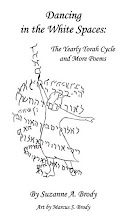“What’s in a Name”
Erev Pesach, 2008
Suzanne Brody
[Question: Has denominationalism advanced the creative continuity of Jewish life in
What’s in a name? Shakespeare said that a rose by any other name would smell as sweet. And he was right. But, would it still be a rose? As we prepare to be redeemed from
This question of what differentiates us from others in our surrounding culture is still one facing us today. Tonight at the seder we will talk about the four children, and we will read that the “evil” child who asks “what does this mean to you” excludes him- or herself from the Jewish people and had he or she been there, he or she would not have been redeemed with the rest of us.
But would the rest of us really have been redeemed? Have we met the rabbinic requirement of keeping our names? By this, I am not referring to names like Sarah, Rachel, or David. In talking about keeping our names, I think that what the rabbis really meant was keeping our identities as Jews. We all have many names and labels by which we are known. Have we kept our Jewish labels? Are they a part of how we define ourselves?
We Jews have always had multiple names which have both united and divided us. From the time of the late 1880s, we have called ourselves by denominational labels: Reform, Orthodox, Conservative, Reconstructionist, and Humanist; to name a few. Recently, we have expanded the list of possible names to include non-denominational, post-denominational, and just plain Jewish. The National Jewish Population study conducted in 2000, suggests that perhaps we are starting to move away from associating ourselves with individual denominations within Judaism. Although 81% of the survey respondents with two Jewish parents were raised in a denomination, as adults, only 68% of them identify with one of the four major denominations (Reform, Conservative, Orthodox, and Reconstructionist)[1]. Furthermore, the greatest “denominational” increase actually occurred among the respondents who don’t identify with any of the established denominations at all![2]
Are we abandoning the names that we assumed at the turn of the twentieth century? Sociologist and “survey guru” Steven Cohen describes two main groups of people who eschew denominational labels: the non-denominationalists and the post- or trans-denominationalists. Non-denominationists decline to see themselves as aligned with any of the current major denominations and instead identify themselves as "Just Jewish," "Secular" or "Something else Jewish". Non-denominational Jews often come from intermarried parents and themselves marry non-Jews, perhaps due to their lack of overall Jewish engagement, symbolized by the fact that fewer than 15% of them affiliate with any synagogue of any denomination. According to comparisons between the 1990 and 2000 National Jewish Population Surveys, numbers of such unaffiliated, unengaged Jews are increasing[3].
In contrast, post- or trans-denominational Judaism is appealing to many committed Jews experiencing ideological and stylistic differences with the available denominational options. According to a recent survey of emergent communities, there are more than 80 non-denominationally-affiliated congregations in the
Author Michael Kress contends that “Jews today define themselves less and less by their denomination, and tend to be more fluid in drifting between them”[7]. Sociologist Dr. Bruce Phillips counters that claim by pointing out that the more Jewish education a person has, the more likely he or she is to identify with a particular denomination.
Names do have power, but only if we know what they mean. I believe that the denominations have each contributed significantly to our Jewish experience, and they have the power to continue to do so for many years yet to come. But the influence of the denominations is only as strong as the education of the affiliated Jews. How can you tell yourself apart from the surrounding non-Jewish culture? How do you know that you are ready to be redeemed this Passover? Have you kept your Jewish name? More importantly, does that name mean anything to you? It is up to each and every one of us to find a way to make our various Jewish names meaningful. Each of us has the capacity to be the “wise child” who learns about even the most minute details of the Exodus from
I look forward to seeing all of you and your friends on Tuesday evening, at
[1] Kaplan, p. 403
[2] Kaplan, p. 403
[3] Cohen, Steven M. “Non-Denominational & Post-Denominational: Beyond the major movements--two tendencies in American Jewry.” Reprinted with permission from Contact, the Journal of Jewish Life Network/Steinhardt Foundation (Summer 2005). http://www.myjewishlearning.com/history_community/Jewish_World_Today/Denominations/PostDenom.htm
[4] Cohen, Steven M.; Landres, Shawn; Kaunfer, Elie; and Shain, Michelle “EMERGENT JEWISH COMMUNITIES and their PARTICIPANTS: Preliminary Findings from the 2007 National Spiritual Communities Study” Sponsored by The S3K Synagogue Studies Institute & Mechon Hadar
http://www.synagogue3000.org/emergentweb//survey/documents/NatSpirComStudyReport_S3K_Hadar.pdf
[5] Cohen, Steven M. “Non-Denominational & Post-Denominational: Beyond the major movements--two tendencies in American Jewry.” Reprinted with permission from Contact, the Journal of Jewish Life Network/Steinhardt Foundation (Summer 2005). http://www.myjewishlearning.com/history_community/Jewish_World_Today/Denominations/PostDenom.htm
[6] Kress, Michael “The Changing Face of the Rabbinate” on http://www.myjewishlearning.com/daily_life/Prayer/TO_Synagogue/Rabbi/RabbiDemographicChanges.htm
[7] Kress, Michael “The Changing Face of the Rabbinate” on http://www.myjewishlearning.com/daily_life/Prayer/TO_Synagogue/Rabbi/RabbiDemographicChanges.htm

1 comment:
Suzanne, I enjoyed your sermon a lot. I am sure you will have a lot of discussion and lively debate about this issue this Passover (as well as Passovers to come), especially as identity can be such a fluid concept as we continually evolve into ourselves. Hag Sameach!
Post a Comment